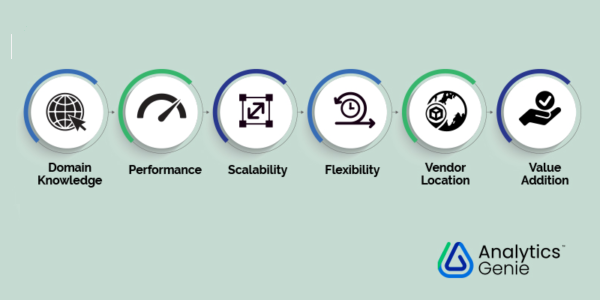A data analytics vendor can really change the face of your business, provided you choose well!
“Without analytics, companies are blind and deaf wandering on the web like a deer on a freeway,” – Geoffrey Moore.
A Gartner report indicates that by 2022, 35% of large organizations will be either sellers or buyers of data via formal online data marketplaces, up from 25% in 2020. The onus is now on the businesses to evolve their ability to leverage this data and generate actionable insights through it.

Rapid innovation in AI/ML technologies and a shortage of trained resources is leading the demand for Analytics/Data science outsourcing. Led by this demand, there has been an explosion of
analytics vendors and choosing the right one has become a critical part of any business’s digital transformation journey. Given a wide choice of vendors who claim to have analytics prowess but often lack differentiation, businesses need to look deeper, ask the right questions, and carefully select the vendor that best matches their requirements.
Let us look at the key factors to consider when selecting a vendor.
1. Domain Knowledge
Does the vendor have knowledge of your business domain?
Most analytics vendors would have resources with the desired technical expertise, training and education whether its statistical skills or expertise in languages like R, SAS, Python etc. However, their domain

expertise will be the differentiator in how quickly they can build the solution. For example, a supply chain optimization expert can build a marketing optimization algorithm, but it may not be as effective and would take much longer to get there.
The business benefits significantly when the vendor has domain expertise, as a considerable amount of time is saved in explaining critical nuances of the data to vendors with little domain expertise.
2. Performance
Can the vendor provide references from clients in the same industry?

This may sound quite simple, but too often clients don’t ask for or complete vendor reference checks.Yes, vendors are likely to provide the names of happy
customers only, but an in depth enquiry can yield great results. This can be as simple as talking with the vendor’s client informally to get the feedback rather than relying on rigid tools like surveys. Getting feedback from three different organizations would be ideal.
If you are planning to get into a large and long-term partnership with a vendor, then culture fit and work style are vital. Here are three questions you should always ask:
• How are decisions taken in your organization?
• How will you communicate progress on the work, including changes or delays?
• How are disruptions caused by changes in the team structure managed?
3. Scalability
Does the vendor have the means to scale?
For a business that is looking to grow, one will need a data analytics vendor who can partner in this growth. Vendors who scale staff linearly for increased scope of similar

work, e.g., additional regions, or categories for a forecasting project, indicate a services model that hasn’t matured beyond labor arbitrage or staff augmentation. Vendors who have technology enabled solutions or accelerators should rank higher on an evaluation scale.
4. Flexibility
Is the vendor flexible to accommodate changes in scope?

Unlike typically process outsourcing, analytics projects are generally fluid in their scope by design. The initial phase of data discovery often leads to a different path than anticipated.
While clients need to be aware of scope creep, the right vendor will always be willing to accommodate scope change within reasonable limits.
5. Vendor location
Should you go for an offshore, onshore or near-shore vendor?
All three categories of vendors come with their advantages and disadvantages. If you engage an onshore vendor, the communication aspect is smooth;however, if the business is situated in a high-cost

location, the feasibility of an onshore vendor becomes a problem. In contrast, the offshore vendor may be extremely cost-effective, but they may be harder to work with.
When it comes to near-shore vendors, the time difference becomes negligible, the language is easy to understand and it is only the technical expertise that needs to be evaluated. At an overall level, listing down the pros and cons of all the options available, a cost benefit analysis and ease of working should determine the geographical location of the vendor.
6. Value addition
What is the ROI from the engagement?

ROI is an area of business that is typically a client’s objective. However, smart vendors will be able to cite examples where key insights improved business outcomes and positively impacted the client’s ROI.
Mature vendors challenge and push the client’s thinking on what problem is being targeted through an Analytics solution and how it will be operationalized.
There is a giant pool of analytics vendors who can provide a host of capabilities, but finding and choosing that right vendor for a project can be challenging. AnalyticsGenie dramatically simplifies this by shortlisting Analytics vendors around the world and showcasing what they can do at www.analyticsgenie.com. Visit us and help us help you find the perfect match for your Analytics needs.

Leave a Reply